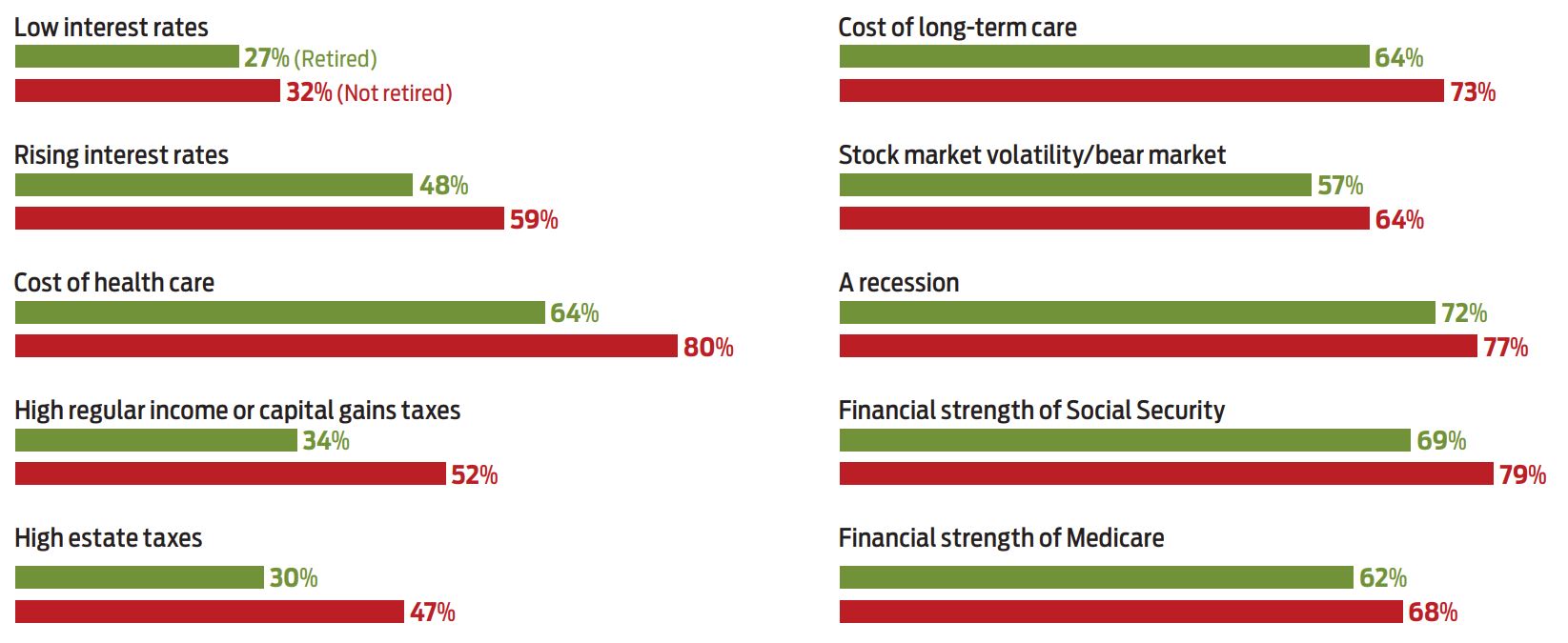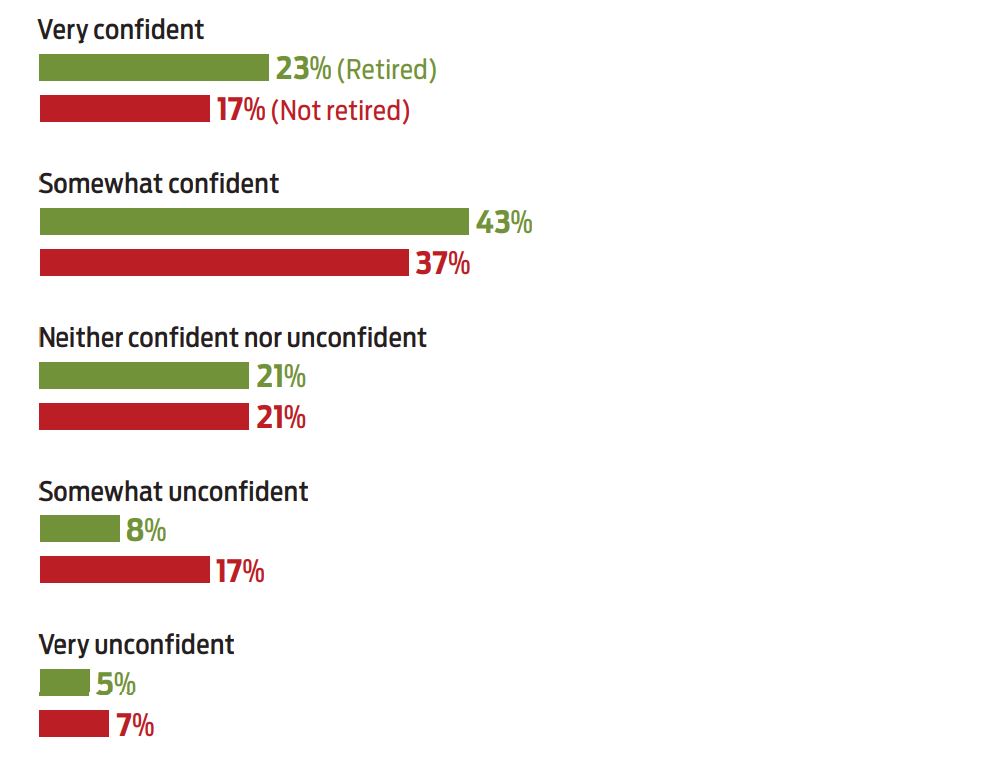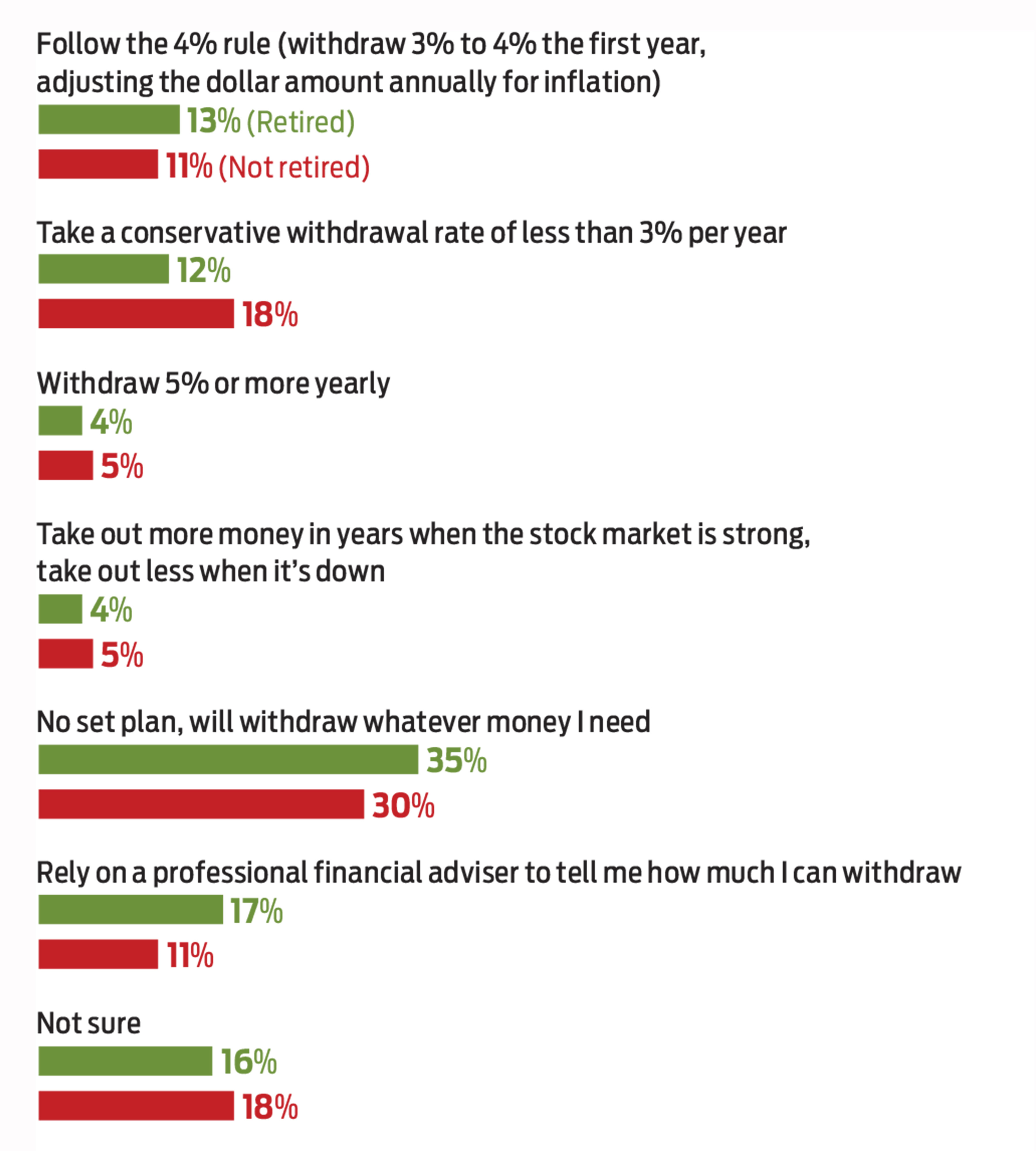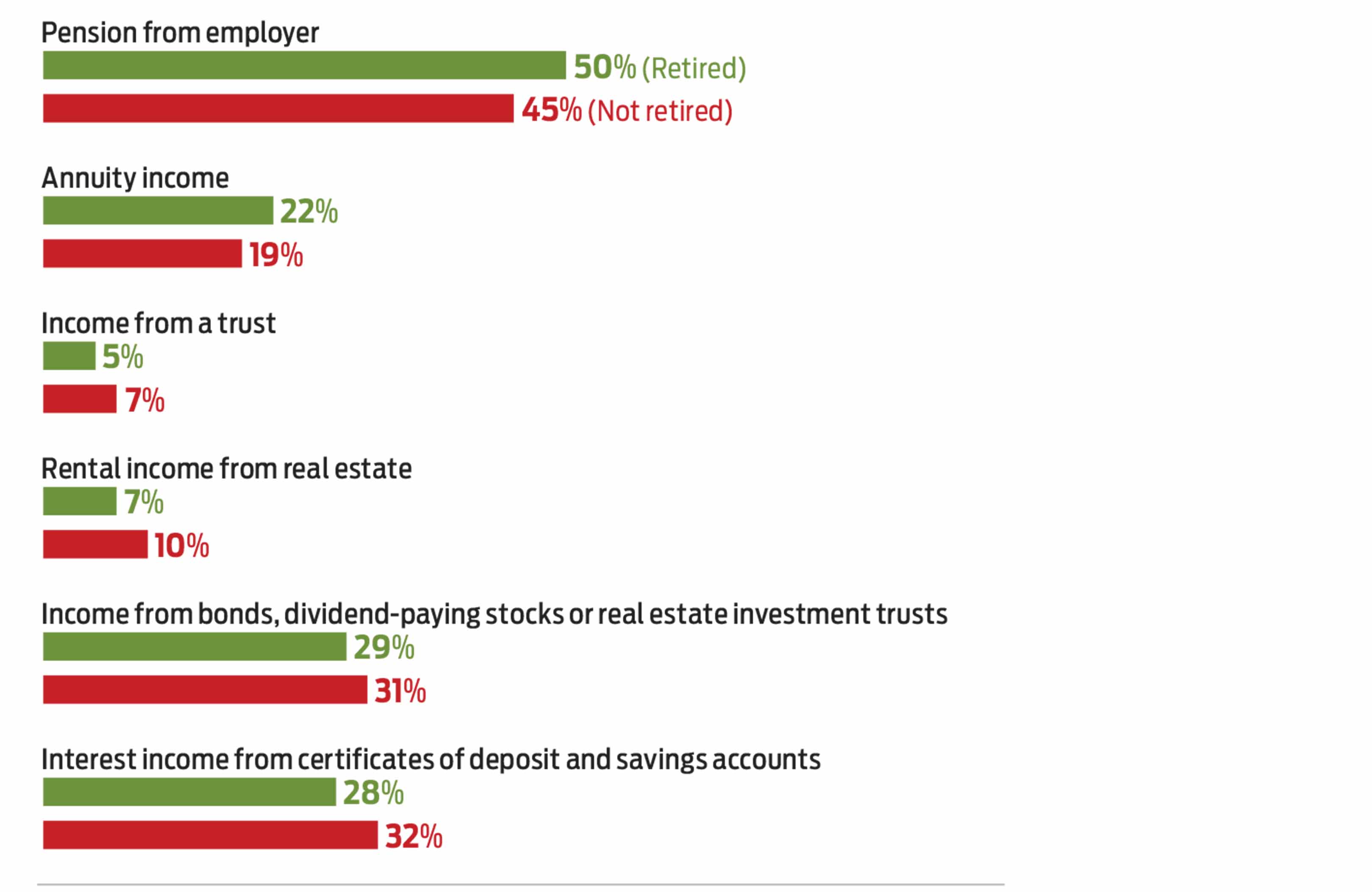A Kiplinger-ATHENE Poll: Retirees Are Worried About Money
Concerns about recession, inflation and health care costs weigh on retirees and near retirees.

Profit and prosper with the best of Kiplinger's advice on investing, taxes, retirement, personal finance and much more. Delivered daily. Enter your email in the box and click Sign Me Up.
You are now subscribed
Your newsletter sign-up was successful
Want to add more newsletters?

Delivered daily
Kiplinger Today
Profit and prosper with the best of Kiplinger's advice on investing, taxes, retirement, personal finance and much more delivered daily. Smart money moves start here.

Sent five days a week
Kiplinger A Step Ahead
Get practical help to make better financial decisions in your everyday life, from spending to savings on top deals.

Delivered daily
Kiplinger Closing Bell
Get today's biggest financial and investing headlines delivered to your inbox every day the U.S. stock market is open.

Sent twice a week
Kiplinger Adviser Intel
Financial pros across the country share best practices and fresh tactics to preserve and grow your wealth.

Delivered weekly
Kiplinger Tax Tips
Trim your federal and state tax bills with practical tax-planning and tax-cutting strategies.

Sent twice a week
Kiplinger Retirement Tips
Your twice-a-week guide to planning and enjoying a financially secure and richly rewarding retirement

Sent bimonthly.
Kiplinger Adviser Angle
Insights for advisers, wealth managers and other financial professionals.

Sent twice a week
Kiplinger Investing Weekly
Your twice-a-week roundup of promising stocks, funds, companies and industries you should consider, ones you should avoid, and why.

Sent weekly for six weeks
Kiplinger Invest for Retirement
Your step-by-step six-part series on how to invest for retirement, from devising a successful strategy to exactly which investments to choose.
A bear market accompanied by market volatility has led to shifting perceptions of what constitutes a secure retirement, according to a new national poll by Kiplinger and retirement services company Athene. Top concerns of retirees and near-retirees include a possible recession, the financial security of Social Security, the cost of health care and inflation.
A majority of respondents say that having more guaranteed income in retirement would ease their concerns about running out of money. Even so, an overwhelming majority of current retirees report high levels of satisfaction and happiness. And retirees are generally confident about their financial future, with 70% reporting they expect to have enough income to live comfortably, and 66% saying they are confident they will not run out of money in retirement. However, preretirees are less sanguine. Less than 55% of respondents not yet retired expressed confidence that they will not run out of money at some point.
The poll targeted retirees and pre-retirees with a net worth of at least $100,000; the respondents’ median household net worth (excluding primary residence) was $369,979 for retirees and $322,506 for pre-retirees. The relatively high net worth is one likely reason financial confidence in this survey is higher than reflected in other retirement-confidence surveys.
From just $107.88 $24.99 for Kiplinger Personal Finance
Become a smarter, better informed investor. Subscribe from just $107.88 $24.99, plus get up to 4 Special Issues

Sign up for Kiplinger’s Free Newsletters
Profit and prosper with the best of expert advice on investing, taxes, retirement, personal finance and more - straight to your e-mail.
Profit and prosper with the best of expert advice - straight to your e-mail.
Retirees are a bit more positive about stock market volatility than preretirees. Nearly half (49%) of retirees are concerned that stock market volatility could cause serious economic hardship in retirement (versus 64% of preretirees). Some 68% of retirees say they are doing nothing (and waiting) in response to volatility this year (versus 60% of preretirees).
Among retired respondents, 83% have already claimed Social Security benefits, with a mean claiming age of 63. For 43% of these respondents, Social Security provides 50% or more of their annual retirement income. Top sources of stable income for current retirees (beyond Social Security) include an employer pension; income from bonds, dividend-paying stocks and REITs; CDs and savings accounts; and annuities. More highlights from the poll:
Are you worried about the following economic issues in retirement?

Are you concerned that inflation could cause serious economic hardship for you in retirement?

How confident are you that you will not run out of money in retirement?*

Which of the following things would you worry less about if more of your retirement income were guaranteed?

Which of the following strategies most closely matches how you currently withdraw or plan to withdraw money from your retirement savings each year?*

Which of the following sources of income do you receive or expect to receive at some point?†

Methodology
We surveyed 818 Americans ages 50 and older (about evenly split between retirees and preretirees). Respondents had a net worth of at least $100,000, and the median household net worth (excluding primary residence) was $369,979 for retirees and $322,506 for preretirees. About half of the respondents were men and half women. The poll was conducted by Qualtrics from June 21 to June 24, 2022. The margin of error is 3.4% with a 95% confidence level.
*Figures do not add up to 100% due to rounding.
†Respondents were asked to select all that apply.
Profit and prosper with the best of Kiplinger's advice on investing, taxes, retirement, personal finance and much more. Delivered daily. Enter your email in the box and click Sign Me Up.
-
 Farmers Brace for Another Rough Year
Farmers Brace for Another Rough YearThe Kiplinger Letter The agriculture sector has been plagued by low commodity prices and is facing an uncertain trade outlook.
-
 Stocks Drop as Iran Worries Ramp Up: Stock Market Today
Stocks Drop as Iran Worries Ramp Up: Stock Market TodayPresident Trump said he will decide within the next 10 days whether or not the U.S. will launch military strikes against Iran.
-
 Over 65? Here's What the New $6K Senior Tax Deduction Means for Medicare IRMAA
Over 65? Here's What the New $6K Senior Tax Deduction Means for Medicare IRMAATax Breaks A new tax deduction for people over age 65 has some thinking about Medicare premiums and MAGI strategy.
-
 What Does Medicare Not Cover? Eight Things You Should Know
What Does Medicare Not Cover? Eight Things You Should KnowMedicare Part A and Part B leave gaps in your healthcare coverage. But Medicare Advantage has problems, too.
-
 15 Reasons You'll Regret an RV in Retirement
15 Reasons You'll Regret an RV in RetirementMaking Your Money Last Here's why you might regret an RV in retirement. RV-savvy retirees talk about the downsides of spending retirement in a motorhome, travel trailer, fifth wheel, or other recreational vehicle.
-
 457 Plan Contribution Limits for 2026
457 Plan Contribution Limits for 2026Retirement plans There are higher 457 plan contribution limits in 2026. That's good news for state and local government employees.
-
 Estate Planning Checklist: 13 Smart Moves
Estate Planning Checklist: 13 Smart Movesretirement Follow this estate planning checklist for you (and your heirs) to hold on to more of your hard-earned money.
-
 Medicare Basics: 12 Things You Need to Know
Medicare Basics: 12 Things You Need to KnowMedicare There's Medicare Part A, Part B, Part D, Medigap plans, Medicare Advantage plans and so on. We sort out the confusion about signing up for Medicare — and much more.
-
 The Seven Worst Assets to Leave Your Kids or Grandkids
The Seven Worst Assets to Leave Your Kids or Grandkidsinheritance Leaving these assets to your loved ones may be more trouble than it’s worth. Here's how to avoid adding to their grief after you're gone.
-
 SEP IRA Contribution Limits for 2026
SEP IRA Contribution Limits for 2026SEP IRA A good option for small business owners, SEP IRAs allow individual annual contributions of as much as $70,000 in 2025, and up to $72,000 in 2026.
-
 Roth IRA Contribution Limits for 2026
Roth IRA Contribution Limits for 2026Roth IRAs Roth IRAs allow you to save for retirement with after-tax dollars while you're working, and then withdraw those contributions and earnings tax-free when you retire. Here's a look at 2026 limits and income-based phaseouts.